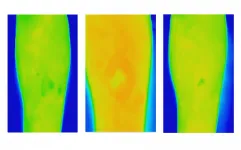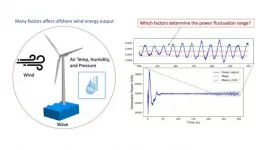Thinking in 3D improves mathematical skills
2021-06-30
(Press-News.org) Spatial reasoning ability in small children reflects how well they will perform in mathematics later. Researchers from the University of Basel recently came to this conclusion, making the case for better cultivation of spatial reasoning.
Good math skills open career doors in the natural sciences as well as technical and engineering fields. However, a nationwide study on basic skills conducted in Switzerland in 2019 found that schoolchildren achieved only modest results in mathematics. But it seems possible to begin promoting math skills from a young age, as Dr. Wenke Möhring's team of researchers from the University of Basel reported after studying nearly 600 children.
The team found a correlation between children's spatial sense at the age of three and their mathematical abilities in primary school. "We know from past studies that adults think spatially when working with numbers - for example, represent small numbers to the left and large ones to the right," explains Möhring. "But little research has been done on how spatial reasoning at an early age affects children's learning and comprehension of mathematics later."
The study, which was published in the journal Learning and Instruction, suggests that there is a strong correlation between early spatial skills and the comprehension of mathematical concepts later. The researchers also ruled out the possibility that this correlation is due to other factors, such as socio-economic status or language ability. Exactly how spatial ability affects mathematical skills in children is still unclear, but the spatial conception of numbers might play a role.
The findings are based on the analysis of data from 586 children in Basel, Switzerland. As part of a project on language acquisition of German as a second language, the researchers gave three-year-old children a series of tasks to test cognitive, socio-emotional and spatial abilities. For example, the children were asked to arrange colored cubes in certain shapes. The researchers repeated these tests four times at an interval of about 15 months and compared the results with the academic performance of seven-year-old children in the first grade.
The researchers also closely examined whether the pace of development, i.e. particularly rapid development of spatial abilities, can predict future mathematical ability. Past studies with a small sample size had found a correlation, but Möhring and her colleagues were unable to confirm this in their own study. Three-year-old children who started out with low spatial abilities improved them faster in the subsequent years, but still performed at a lower level in mathematics when they were seven years old. Despite faster development, by the time they began school these children had still not fully caught up with the children possessing higher initial spatial reasoning skills.
"Parents often push their children in the area of language skills," says Möhring. "Our results suggest how important it is to cultivate spatial reasoning at an early age as well." There are simple ways to do this, such as using "spatial language" (larger, smaller, same, above, below) and toys - e.g. building blocks - that help improve spatial reasoning ability.
Spatial reasoning and gender
The researchers found that boys and girls are practically indistinguishable in terms of their spatial reasoning ability at the age of three, but in subsequent years this develops more slowly in girls. Möhring and her colleagues suspect that boys may hear more "spatial language" and that toys typically designed for boys often promote spatial reasoning, whereas toys for girls focus mainly on social skills. Children may also internalize their parents' and teacher's expectations and then, as they grow up, live up to stereotypes - for example, that women do not perform as well in the areas of spatial reasoning and mathematics as men.
INFORMATION:
ELSE PRESS RELEASES FROM THIS DATE:
2021-06-30
New research shows thermal imaging techniques can predict whether a wound needs extra management, offering an early alert system to improve chronic wound care.
It is estimated that 1-2% of the population will experience a chronic wound during their lifetime in developed countries - in the US, chronic wounds affect about 6.5 million patients with more than US$25 billion each year spent by the healthcare system on treating related complications.*
The Australian study shows textural analysis of thermal images of venous leg ulcers (VLUs) can detect whether a wound needs extra management as early as week two for clients receiving treatment at home.
The clinical study by RMIT University and Bolton Clarke, published in the Nature journal Scientific Reports, is the first to investigate ...
2021-06-30
Decision-makers around the world are increasingly interested in using ecosystem solutions such as mangroves, coral reefs, sand dunes and forests on steep slopes to help buffer the impacts from hazard events and protect populations. But what evidence exists to show the efficacy of nature-based solutions over man-made protective measures to reduce the impacts of the increasing numbers of hazard events humanity faces due to climate change?
An international, multi-disciplinary team of 28 researchers has examined nearly 20 years' worth of peer-reviewed studies on the impacts of ecosystem-based disaster ...
2021-06-30
A study analysing the association between a wide variety of prenatal and childhood exposures and neuropsychological development in school-age children has found that organic food intake is associated with better scores on tests of fluid intelligence (ability to solve novel reasoning problems) and working memory (ability of the brain to retain new information while it is needed in the short term). The study, published in Environmental Pollution, was conceived and designed by researchers at the Barcelona Institute for Global Health (ISGlobal)--a centre supported by the "la Caixa" Foundation--and ...
2021-06-30
A scientific breakthrough: Researchers from Tel Aviv University have engineered the world's tiniest technology, with a thickness of only two atoms. According to the researchers, the new technology proposes a way for storing electric information in the thinnest unit known to science, in one of the most stable and inert materials in nature. The allowed quantum-mechanical electron tunneling through the atomically thin film may boost the information reading process much beyond current technologies.
The research was performed by scientists from the Raymond and Beverly Sackler School of Physics and Astronomy and Raymond and Beverly Sackler School of Chemistry. The group includes Maayan Vizner Stern, Yuval Waschitz, Dr. Wei Cao, Dr. Iftach Nevo, Prof. Eran Sela, Prof. Michael Urbakh, ...
2021-06-30
Working out just five minutes daily via a practice described as "strength training for your breathing muscles" lowers blood pressure and improves some measures of vascular health as well as, or even more than, aerobic exercise or medication, new CU Boulder research shows.
The study, published June 29 in the Journal of the American Heart Association, provides the strongest evidence yet that the ultra-time-efficient maneuver known as High-Resistance Inspiratory Muscle Strength Training (IMST) could play a key role in helping aging adults fend off cardiovascular disease - the nation's leading killer.
In the United States alone, 65% of adults over age 50 have ...
2021-06-30
A University of Arkansas researcher and international colleagues found that employed individuals, on average, are 35.3% more likely to be infected with the flu virus.
The findings confirm a long-held assumption about one prevalent way illness spreads and could influence government policy on public health and several issues for private companies, from optimal design and management of physical work spaces to policy decisions about sick leave and remote work.
To track influenza incidence, Dongya "Don" Koh, assistant professor of economics in the Sam M. Walton College of Business, and colleagues relied on nationally representative data from the Medical ...
2021-06-30
A new study shows that colleges students are experiencing significant grief reactions in response to the COVID-19 pandemic. The paper, "College Student Experiences of Grief and Loss Amid the COVID-19 Global Pandemic," was recently published in OMEGA - Journal of Death and Dying.
"This study aimed to identify the most common non-death losses and grief reactions experienced by undergraduate and graduate college students amid the pandemic," said author Erica H. Sirrine, Ph.D., director of Social Work at St. Jude Children's Research Hospital. "What we found is that students ...
2021-06-30
New Brunswick, N.J. (June 28, 2021) - Rutgers researchers have developed a machine learning model using a physics-based simulator and real-world meteorological data to better predict offshore wind power.
The findings appear in the journal Applied Energy.
Offshore wind is rapidly maturing into a major source of renewable energy worldwide and is projected to grow by 13% in the next two decades and 15-fold by 2040 to become a $1 trillion industry, matching capital spending on gas- and coal-fired power generation. In the United States, for instance, New York and New Jersey recently awarded two offshore ...
2021-06-30
When it comes to climate change, not all organisms will lose out. A new Cal Poly study finds that rattlesnakes are likely to benefit from a warming climate.
A combination of factors makes a warming climate beneficial to rattlesnakes that are found in almost every part of the continental United States but are especially common in the Southwest.
Rattlers are experts at thermoregulation. Researchers found that, when given a choice, the snakes prefer a body temperature of 86-89 degrees Fahrenheit, a much warmer temperature than they generally experience in nature. The average ...
2021-06-30
CHICAGO (June 30, 2021) -- Four leading medical specialty societies released a new clinical practice guideline today that includes recommendations for reducing blood loss during heart surgery and improving patient outcomes. The document, a multidisciplinary collaboration among The Society of Thoracic Surgeons, the Society of Cardiovascular Anesthesiologists, the American Society of ExtraCorporeal Technology, and the Society for the Advancement of Patient Blood Management, is available online in The Annals of Thoracic Surgery and two other journals.
"As medicine evolves and we learn more, it always is important to review past ...
LAST 30 PRESS RELEASES:
[Press-News.org] Thinking in 3D improves mathematical skills




